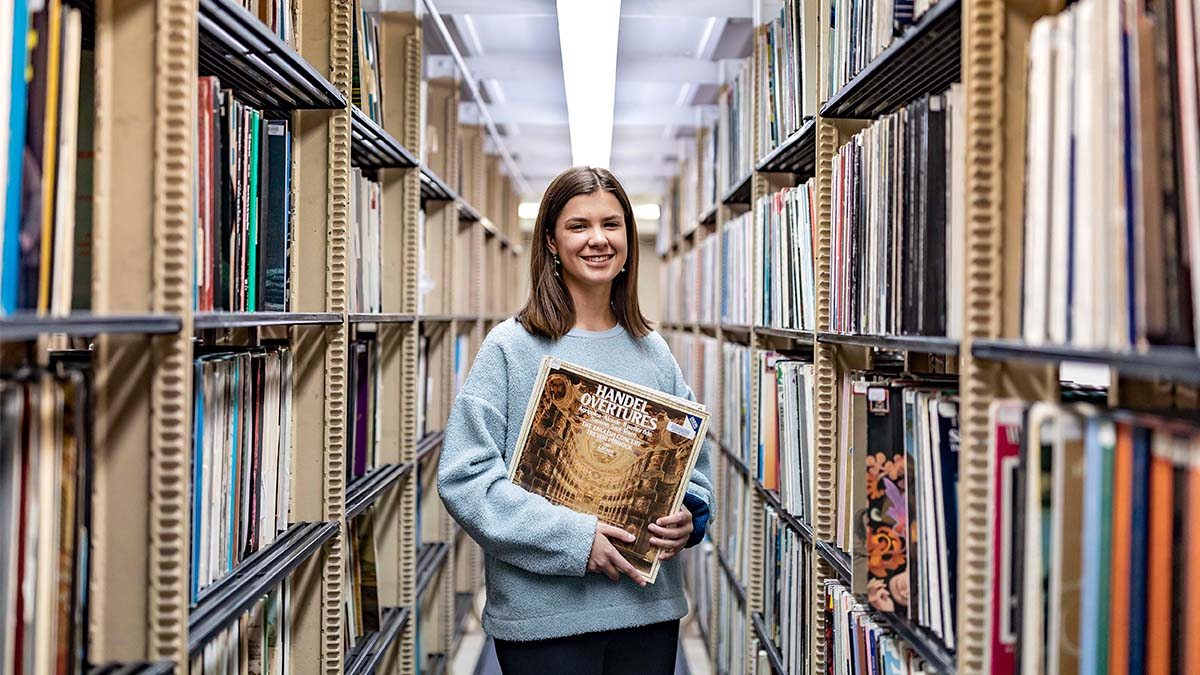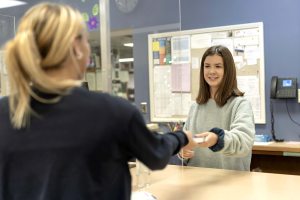Reigniting a love for music
Junior Caroline Norland put her passion for music aside to focus on academics, but a work-study opportunity in the music library reminded her of why she picked up her viola in the first place.

Caroline Norland studied classical music for most of her life but thought that she had to choose between her passion for science and the viola when she started college. When she discovered Carolina’s Music Library, she found a way to balance her first love and her academic goals.
Norland, a junior biology major, has been an assistant at the Music Library, part of the University Libraries, for the last two years. Located on the first floor of Wilson Library, the space holds thousands of pages of rare and valuable sheet music, vinyl albums, CDs, audio recordings, musical instruments and textbooks.
Norland is one of many work-study students who helps patrons find materials, sort and shelve sheet music and send damaged works for restoration.
“When choosing my work study, I wanted to work somewhere where I knew I would be interacting with students, faculty and staff I wouldn’t normally meet,” Norland says. “It felt like a good way to get involved on campus after the pandemic.”
Norland heard about the Music Library for the first time while exploring work-study options, and after seeing all the resources available, she jumped at the chance to delve into music once more.
“I’ve always loved libraries. They feel like a safe place that’s one of the few locations left in society where you study, talk or spend time without spending money,” Norland says. “I want to pursue a career in medicine after graduation and knew I wouldn’t have much spare time to devote to the violin and viola anymore, but it was such a huge part of my life for so long that I missed it.”

Caroline Norland passes a book to a patron of the Music Library. (Johnny Andrews/UNC-Chapel Hill)
Working at the Music Library gives Norland the opportunity to still engage with music. As a classically trained musician, she can read the library’s sheet music or listen to vinyl, CDs and recordings and recognize the genre or composer. Spending time in the stacks also gives her the chance to learn about artists she wasn’t exposed to during her classical education.
“I’m constantly learning about new genres, composers, artists and cultures just by helping those who visit find materials,” Norland says. “I love hearing what types of music people are passionate about and studying; working here is a type of music education in itself.”
Norland’s work in the Music Library serves as a welcome respite from her focus on advanced biology courses and also sharpens her memory and problem-solving skills.
“There’s a proven connection between playing music and excelling at science and math,” Norland says. “Reading music improves pattern recognition skills, which is helpful for learning biological pathways, and memorizing music and recalling it while playing makes memorizing for classes much easier.”
While Norland misses performing, she says that her work in the Music Library still contributes to the arts and keeps her skills sharp for when she does pick up her viola or violin.
“Working in the Music Library has reignited my love for music and reminds me that it’s universal and meant to be enjoyed by everyone – each day I get to see everyone’s passion for playing or studying music from behind this desk,” Norland says.




